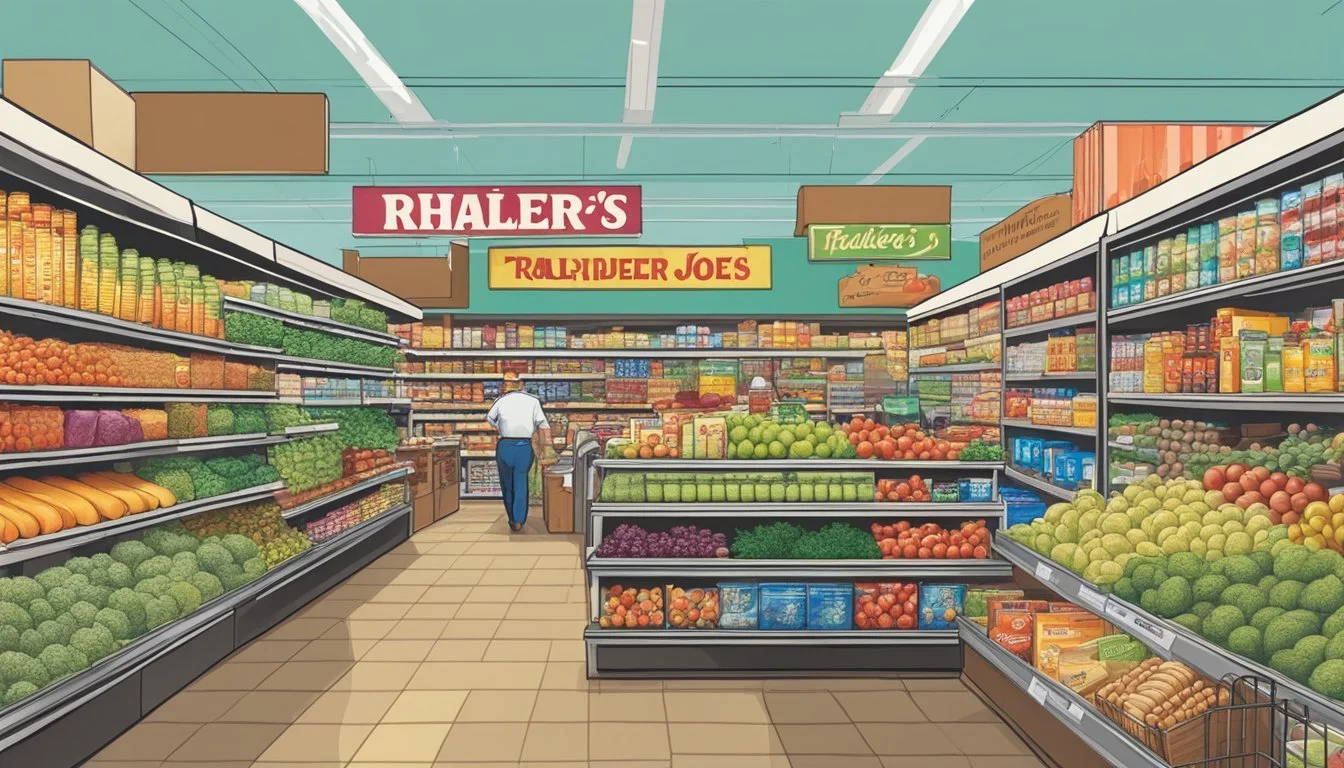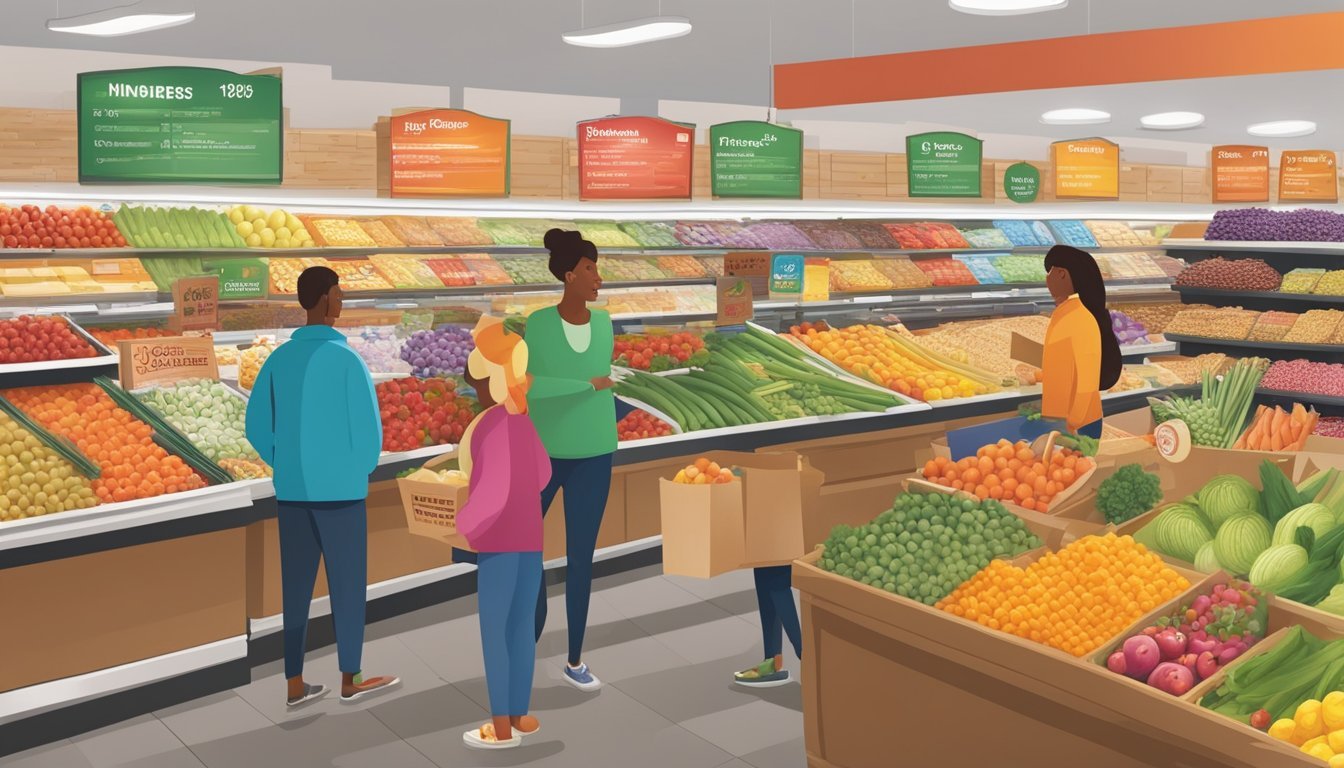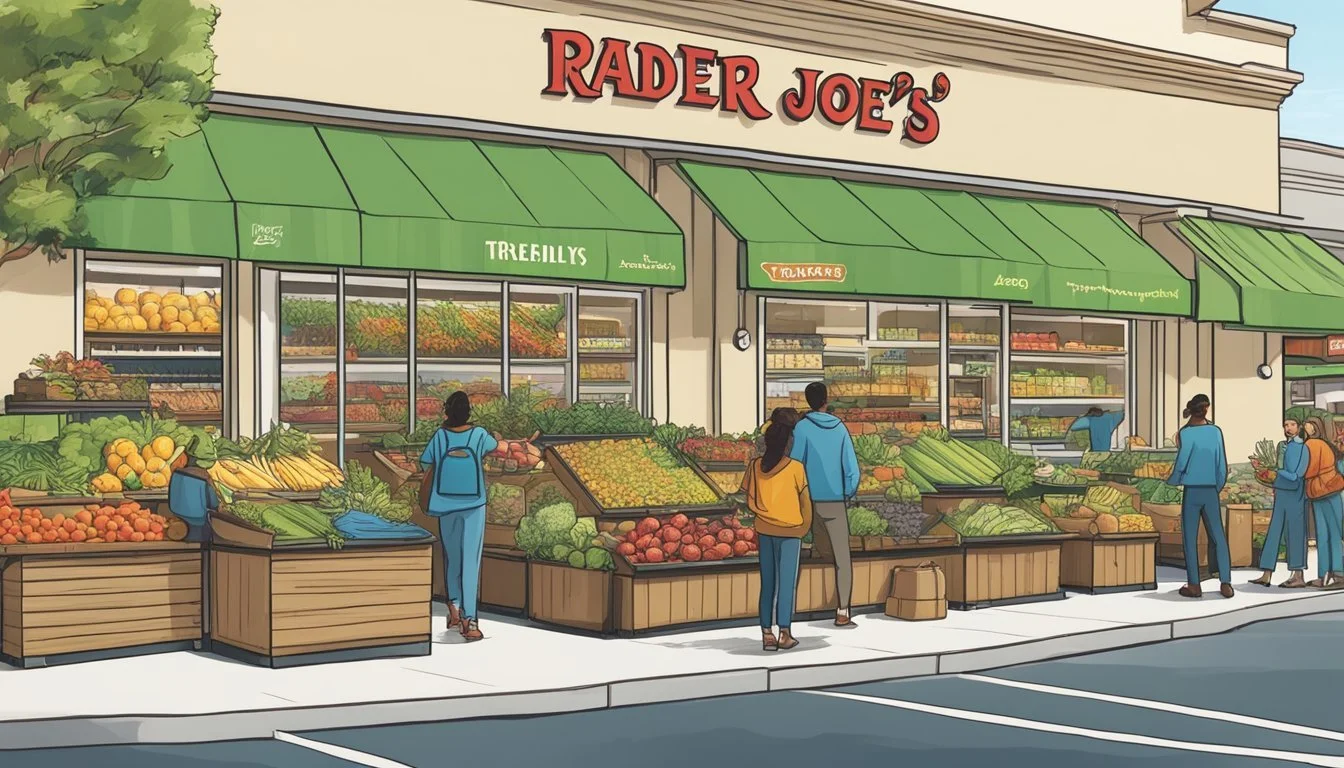Trader Joe's vs Ralphs
Comparing Quality, Variety, and Value
Part of Our Grocery Store Guide with Details on Trader Joe's and Ralphs
When it comes to grocery shopping, everyone looks for a store that offers a balance of quality, selection, and value. Trader Joe's and Ralphs are two well-known grocery chains that serve millions of customers across the United States, each with their own unique approach to retail. Trader Joe's is renowned for its quirky branding, a plethora of privately labeled products, and a commitment to affordable, healthy options. Ralphs, on the other hand, operates as a traditional supermarket, providing a wide assortment of brands across all typical grocery categories.
Comparing Trader Joe's and Ralphs involves evaluating several factors including product pricing, quality, variety, and the overall shopping experience. Trader Joe's often positions itself as the better deal based on its curated selection of cost-effective goods that appeal to health-conscious and gourmet shoppers. Conversely, Ralphs boasts a broader selection, catering to a wider array of preferences and dietary needs, often facilitating one-stop shopping convenience.
Shoppers have reported that they find significant savings at Trader Joe's on many staples, while still enjoying a selection of unique and specialty items. Meanwhile, Ralphs competes by offering competitive prices through club memberships and weekly specials, and by featuring familiar brands that customers trust. The choice between the two often comes down to individual shopping priorities, whether that be price sensitivity, product uniqueness, or brand availability.
Brand Overview
Trader Joe's is renowned for its distinctive approach to grocery retailing. It distinguishes itself through a vast selection of private label products, often curated to cater to gourmet and alternative diets. They famously offer a variety of affordable fancy cheeses, wines, dips, and various other specialty goods. Their focus on house brands contributes to their competitive pricing strategy and allows them to maintain a strong following of dedicated shoppers who appreciate their unique offerings.
Product Selection: Predominantly private label
Price Range: Competitive
Known For: Fancy cheeses, wine, dips
Customer Base: Gourmet, alternative diet shoppers
Ralphs, on the other hand, is a conventional supermarket chain that is a subsidiary of Kroger. It offers a broad selection of both national brand products and store brand items. Ralphs serves a diverse customer base and is a one-stop-shop for shoppers looking for variety and familiar brands. They have frequent promotions and discounts on everyday items which appeal to budget-conscious customers.
Product Selection: Mix of national and store brands
Price Range: Standard, with discounts
Known For: Promotions on everyday items
Customer Base: General supermarket shoppers
Both stores cater to different shopping preferences: Trader Joe's with its curated, exclusive products, and Ralphs with its traditional, wide-ranging inventory.
Store Atmosphere
When comparing Trader Joe's and Ralphs, one must consider store design, service experience, and unique features to fully understand their respective atmospheres.
Store Design
Trader Joe's is renowned for its nautical-themed decor, embodying a unique and charming shopping experience. The stores often feature bells and maritime decorations, fostering a fun and quirky environment. Their aisles are typically narrower, which creates a cozy, boutique-like feel.
In contrast, Ralphs offers a more traditional supermarket design, providing a familiar and straightforward layout for shoppers. The store design is functional, focusing on customer convenience and product accessibility.
Service Experience
Shoppers at Trader Joe's might often comment on the friendly staff and personal service. The employees, known as "crew members," are typically enthusiastic and knowledgeable about products, which can enhance the overall shopping experience.
Ralphs generally provides efficient service with self-checkout options for a speedy shopping trip. The staff is professional and helpful, ensuring customer needs are met without the same level of personal engagement you'd find at Trader Joe's.
Unique Features
Trader Joe's stands out with its exclusive store brand products, many of which are marketed as natural or organic. Their commitment to offering an assortment of unique and often internationally inspired items is a draw for those seeking an adventurous shopping experience.
Ralphs, on the other hand, stays eco-conscious with its recycling programs and energy-efficient stores, aligning with eco-friendly policies. The store features a wider range of brand name products and staple goods, making it a go-to for traditional grocery shopping.
Product Selection
The product selection at Trader Joe's and Ralph's showcases a range of quality and variety. Each grocery store brings a distinct approach to sourcing and offering produce, meat, and pantry staples.
Produce Quality
Trader Joe's is recognized for its consistently fresh and varied produce, often featuring items that cater to seasonal trends. Ralphs, on the other hand, offers a wide choice of both conventional and organic fruits and vegetables, ensuring customers have access to fresh ingredients year-round.
Meat and Poultry
Ralphs keeps a broad selection of meats and poultry, including brand-name products and their in-house Kroger line. Trader Joe's meat selection may be less extensive, but they focus on providing unique offerings such as seasoned and marinated options ready for cooking.
Dairy and Frozen Foods
Trader Joe's:
Dairy: Notable for its Unexpected Cheddar Cheese and a wide array of artisanal cheeses.
Frozen: Mandarin Orange Chicken stands out alongside an eclectic mix of international frozen cuisine.
Ralphs:
Dairy: Offers a comprehensive range of national dairy brands and Kroger brand products.
Frozen: Strong variety of staple frozen goods, from vegetables to ready-to-eat meals.
Bakery and Baked Goods
Trader Joe's bakery section features a diverse array of baked goods, including some exclusive products that have gained a following. Ralphs provides a larger bakery section with numerous bread, pastry, and cake options, often including items from local bakeries.
Private Label Products
Trader Joe's excels with its private label products, from snacks to pantry staples, enticing shoppers with quality comparable to national brands. Ralphs' store brand, Kroger, offers an extensive line of products at competitive prices, covering a wide range of customer needs.
Organic and Special Diet Options
Trader Joe's shines with a robust selection of organic and special diet options, including gluten-free and other health-conscious choices. Ralphs matches this with a substantial organic section and a variety of healthy alternatives under its Simple Truth brand.
Unique Finds
Trader Joe's is renowned for its unique finds, introducing new, unexpected products regularly, which keeps the shopping experience exciting. Ralphs competes with a diverse product line, yet Trader Joe's consistently offers novelty items such as seasonal goods and distinctive flavor combinations that appeal to adventurous shoppers.
Pricing and Value
When comparing Trader Joe's and Ralphs, consumers often consider the balance between price, quality, and value. Discerning shoppers look for competitive prices, enticing deals, and overall quality that meets their budgetary needs.
Price Comparison
Trader Joe's offers a curated selection of goods that generally lean towards being cost-effective while providing a sense of novelty and exclusivity. They rarely offer external brands, which helps them keep their prices consistent and competitive. In contrast, Ralphs operates on a more traditional supermarket model, with a wider array of branded products. Shoppers with a Ralphs club card may find that they can secure better pricing on certain items, thanks to membership discounts.
Example: A comparison of staple items such as milk, bread, and eggs often shows that Ralphs offers lower prices, especially when factoring in club card discounts.
Trader Joe's: Consistent low pricing without the need for cards or coupons.
Special Deals and Savings
Ralphs tends to offer more in the way of promotional deals, weekly sales, and savings through their club cards. These discounts can be substantial for regular shoppers who take the time to track and use them.
Weekly Ads: Ralphs publishes ads with current deals, potentially offering significant savings for attentive consumers.
Club Card: Special pricing and rewards points that can be redeemed for further discounts or products.
Trader Joe's has a less traditional approach to savings, generally not offering weekly ads or coupons, but its everyday prices can be considered as providing continuous value without the need to wait for sales.
Quality for Cost
Determining value is not solely about the sticker price; it is also about the quality received for the money spent. Trader Joe's is known for its unique product selection and consistent quality, particularly in the private-label sector, which many consumers see as justifying the cost. Ralphs, with its broader selection of both generic and name-brand products, offers quality choices at different price points.
Trader Joe's: Generally seen as providing a higher baseline of product quality for the price.
Ralphs: Offers a range from budget items to premium brands, allowing customers to choose based on their quality preferences and budget.
In summary, both grocery stores provide different opportunities for savings and value, with Trader Joe's offering straightforward low pricing, and Ralphs offering a more traditional approach with potential for deals and member-specific discounts.
Shopping Convenience
In considering shopping convenience between Trader Joe's and Ralphs, one must take into account the variety of factors such as the location accessibility, the availability of ready-to-eat options, and the overall grocery shopping experience. These elements can significantly influence consumer preference and shopping habits.
Locations and Accessibility
Trader Joe's has a reputation for strategically choosing their store locations to be within high-density urban areas, such as Manhattan, with particular attention to neighborhoods like the Upper West Side. Their stores are often found in pedestrian-friendly areas, catering to local shoppers who prefer walking or public transportation.
Manhattan: Multiple Trader Joe's locations for easy access.
Upper West Side: At least one Trader Joe's conveniently located for residents.
In contrast, Ralphs tends to have a broader distribution with more suburban locations, offering ample parking suitable for shoppers who drive. In places like Manhattan where space is at a premium, this approach could limit accessibility for those without cars.
Manhattan: Fewer Ralphs stores; may require driving or longer commutes.
Parking Availability: Abundant at most Ralphs locations, less so for Trader Joe's in urban areas.
Ready-to-Eat Options
Trader Joe's is well-known for its array of ready-to-eat food that accommodates shoppers seeking quick meals without the prep time. Their selection ranges from fresh salads and sandwiches to globally-inspired heat-and-eat dishes.
Diverse Selection: A variety of international cuisines available.
Grab and Go: Easy for shoppers in a hurry or seeking convenience.
Ralphs also provides a selection of ready-to-eat food, but the diversity and uniqueness of these options might not be on par with Trader Joe's.
Grocery Shopping Experience
The grocery shopping experience at Trader Joe's is often characterized by a warm, friendly atmosphere with employees known for being helpful and personable. The store layouts are typically easy to navigate, with clear signage and thematic decor that enhances the shopping experience.
Atmosphere: Trader Joe's prides itself on a unique, theme-based store environment.
Employee Engagement: Staff are generally seen as friendly and customer-focused.
Ralphs, meanwhile, offers a more conventional grocery experience. While it may not have the same boutique feel as Trader Joe's, it offers a familiar layout and a wide range of mainstream brands and products.
Store Layout: Traditional and familiar, making it easy for regular customers to find products.
Product Range: Extensive, with more emphasis on well-known brands.
Customer Services
In evaluating customer services, attention to detail in a grocery store's return policy and the avenues for customer feedback are significant indicators of their commitment to service quality.
Return Policy
Trader Joe's boasts a generous return policy, allowing customers to return items with or without a receipt. This no-questions-asked approach ensures customer satisfaction and trust. If a customer is dissatisfied with a purchase, they can expect a straightforward and accommodating experience.
On the other hand, Ralphs requires a receipt for most returns and the return period is typically limited to a standard timeframe. It is notable, however, that Ralphs often honors returns if there is a clear issue with the product, though they might not be as seamless as at Trader Joe’s.
Customer Feedback
Trader Joe's actively seeks out customer feedback through various channels, including in-store surveys and online platforms. They are known for their community feel, where feedback is encouraged and often leads to action—a direct reflection in their service improvement.
Ralphs utilizes customer surveys as well, often found on receipts inviting shoppers to partake in feedback for a chance to win store credit or other incentives. Ralphs values its customers' opinions and appears to utilize feedback to make strategic changes within their stores.
Market Presence
In assessing the market presence of Trader Joe's and Ralph's, it is essential to examine their brand recognition and how they stack up against their competitors.
Brand Recognition
Trader Joe's holds a distinctive position in the grocery industry with a strong brand image centered on a unique selection of products, many of which are private label. This branding approach has helped the store cultivate a dedicated customer base that resonates with its quirky and somewhat eclectic shopping experience. Conversely, Ralphs, part of the Kroger family, carries a broader selection of household brands and staples, appealing to a more traditional grocery shopping crowd.
Competitor Analysis
When measuring the market presence of Trader Joe's and Ralphs, one must consider their standing among industry giants such as Walmart, Costco, and Target. These stores boast vast, nationwide networks and offer a wide range of products, which can often be priced more competitively. In contrast, specialized grocery retailers like Whole Foods Market and Sprouts Farmers Market focus more on health-conscious consumers, aligning somewhat with Trader Joe's niche but at generally higher price points. Ralphs also contends with Safeway and Albertsons across various markets. The presence of online retail behemoth Amazon in the grocery space, especially following its acquisition of Whole Foods, further adds complexity to the competitive landscape. Other notable competitors include Aldi, Wegmans, and Sprouts, each carving out its own segment of the market and defining the field in which Trader Joe's and Ralphs operate.
Sustainability and Social Responsibility
Trader Joe's has established itself as a leader in sustainability within the grocery industry. This company operates on environmental consciousness as a core principle, manifesting in various eco-friendly policies. Trader Joe's maintains a significant selection of organic products, catering to a growing consumer demand for environmentally responsible and health-conscious options.
In contrast, Ralphs—part of the Kroger family of supermarkets—also offers organic options and focuses on sustainable practices. It upholds eco-friendly policies, which include efforts to reduce plastic usage and waste.
Key Sustainability Features
Trader Joe's:
Extensive range of organic offerings
Reduce resource use via smaller store footprints
Ralphs:
Organic product lines available
Commitment to reducing plastic waste
Social Responsibility
Trader Joe's is also known for its charitable initiatives, actively fostering community well-being through various programs. The company seeks to make a positive social impact that resonates with its consumer base.
Ralphs demonstrates social responsibility by participating in hunger relief programs and community involvement, aiming to give back to society.
Each store has carved out a niche in both sustainability and social responsibility, yet they take different paths tailored to their brand ethos. Trader Joe's leverages its private labels to maintain cost-effectiveness, which intersects with its sustainability efforts. Ralphs relies on the infrastructure of its parent company, Kroger, to implement widespread eco-conscious initiatives.
Conclusion
In evaluating Trader Joe's versus Ralphs, consumers witness distinct advantages in both stores. Trader Joe's is celebrated for its unique selections and competitive pricing, predominantly in private-label products. By maintaining a smaller inventory of about 4,000 products, 80% of which are brand-specific, they offer a curated shopping experience with an emphasis on affordability.
Ralphs, on the other hand, attracts customers seeking a traditional supermarket layout with a wider range of national and international brands. Produce, drinks, and spices are particularly strong offerings at Ralphs, making it a go-to for fresh goods and household staples.
Factor Trader Joe's Advantage Ralphs Advantage Pricing Competitive private-label pricing Promotions on national brands Product Selection Curated selection with unique offerings Extensive variety across all categories Brand Availability Primarily Trader Joe's private label Wide range of national and international brands
Shoppers' preferences between Trader Joe's and Ralphs might hinge on product uniqueness versus brand variety. Those who prioritize specialty items and lower-cost alternatives will likely favor Trader Joe's, while those valuing a one-stop shop with brand diversity may opt for Ralphs.
Ultimately, the choice between Trader Joe's and Ralphs does not yield a definitive winner, as each provides distinct benefits tailored to different consumer needs. Shoppers are encouraged to reflect on their priorities when it comes to product range, pricing, and the shopping experience as they make their selection.











